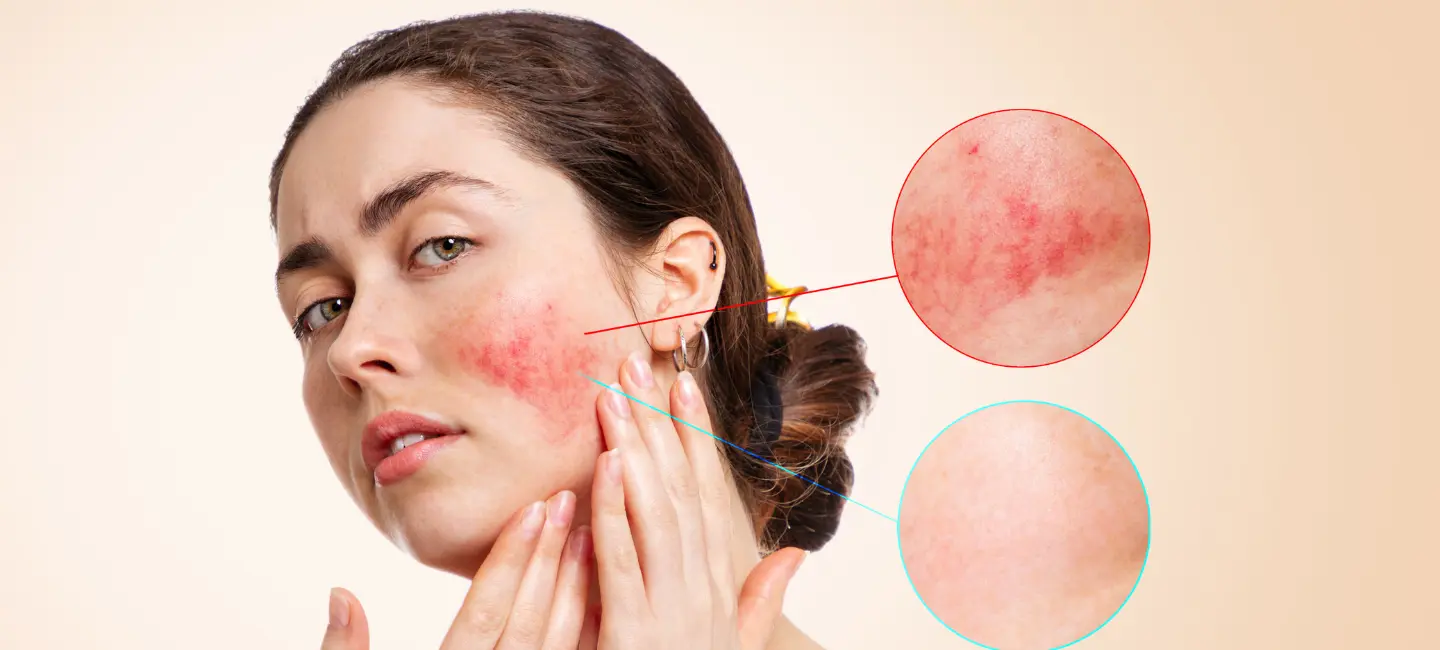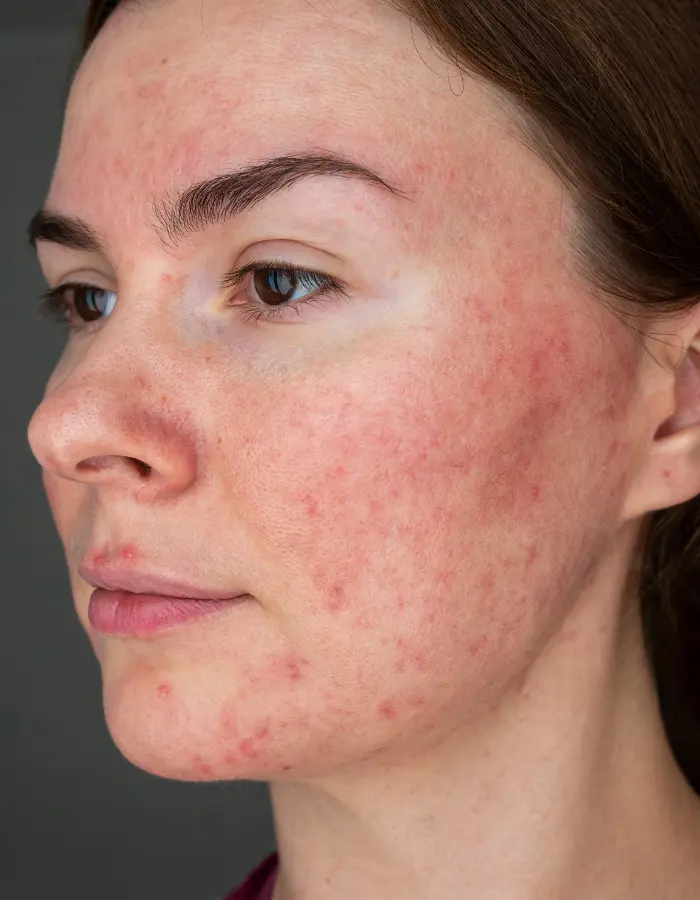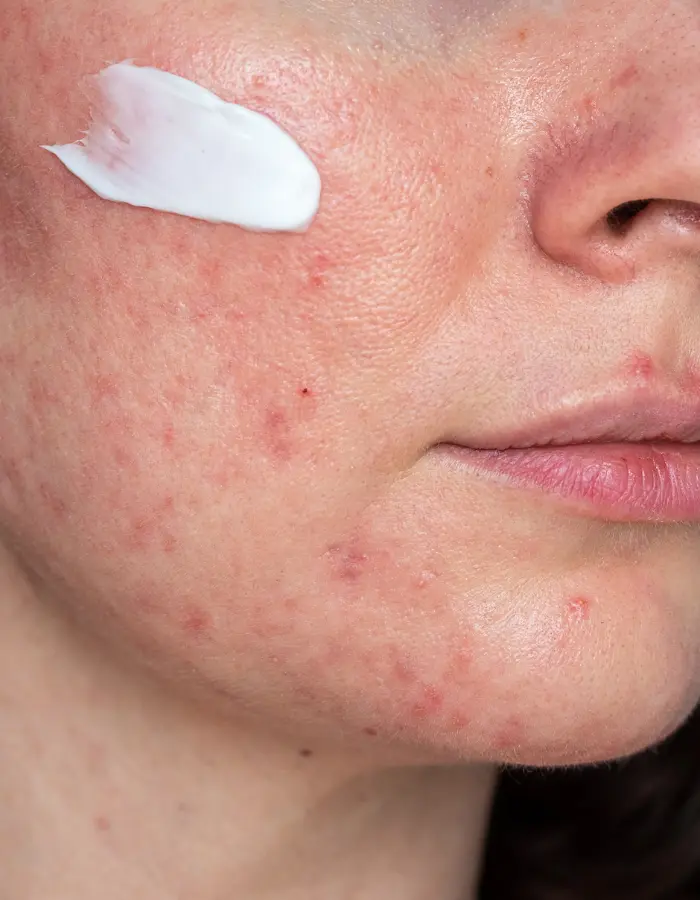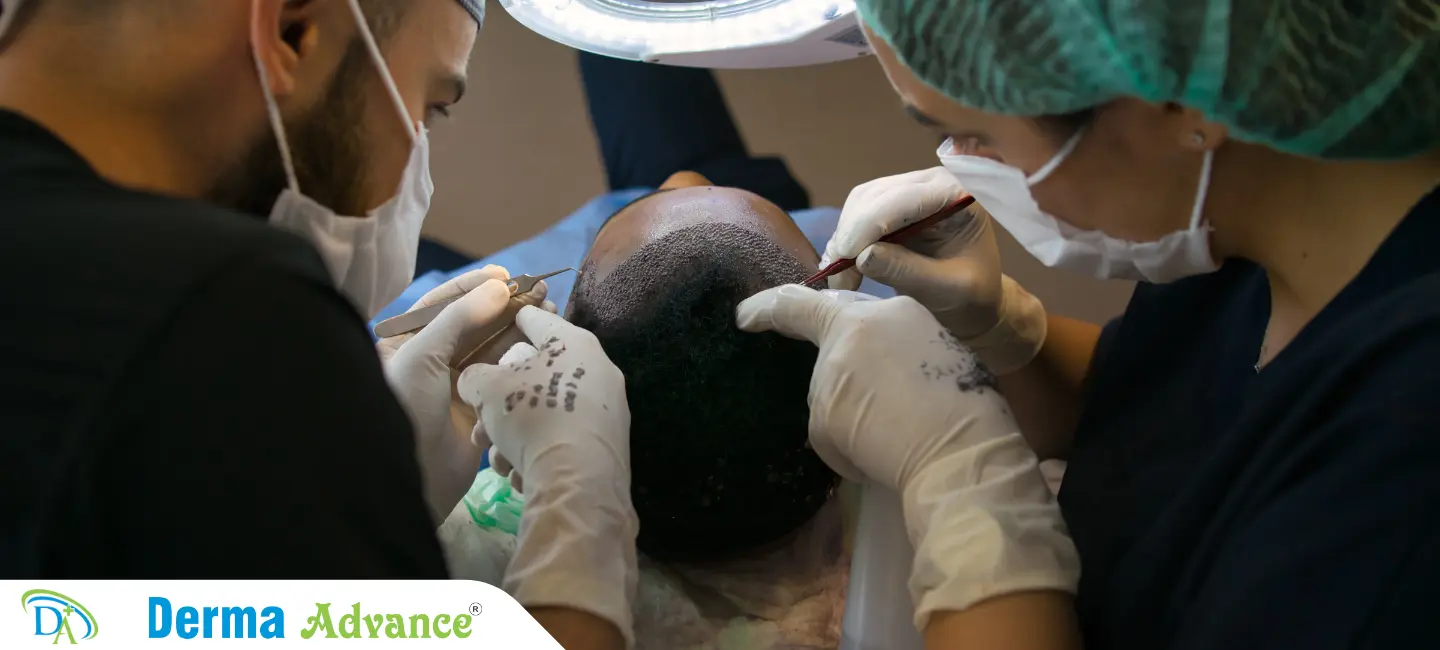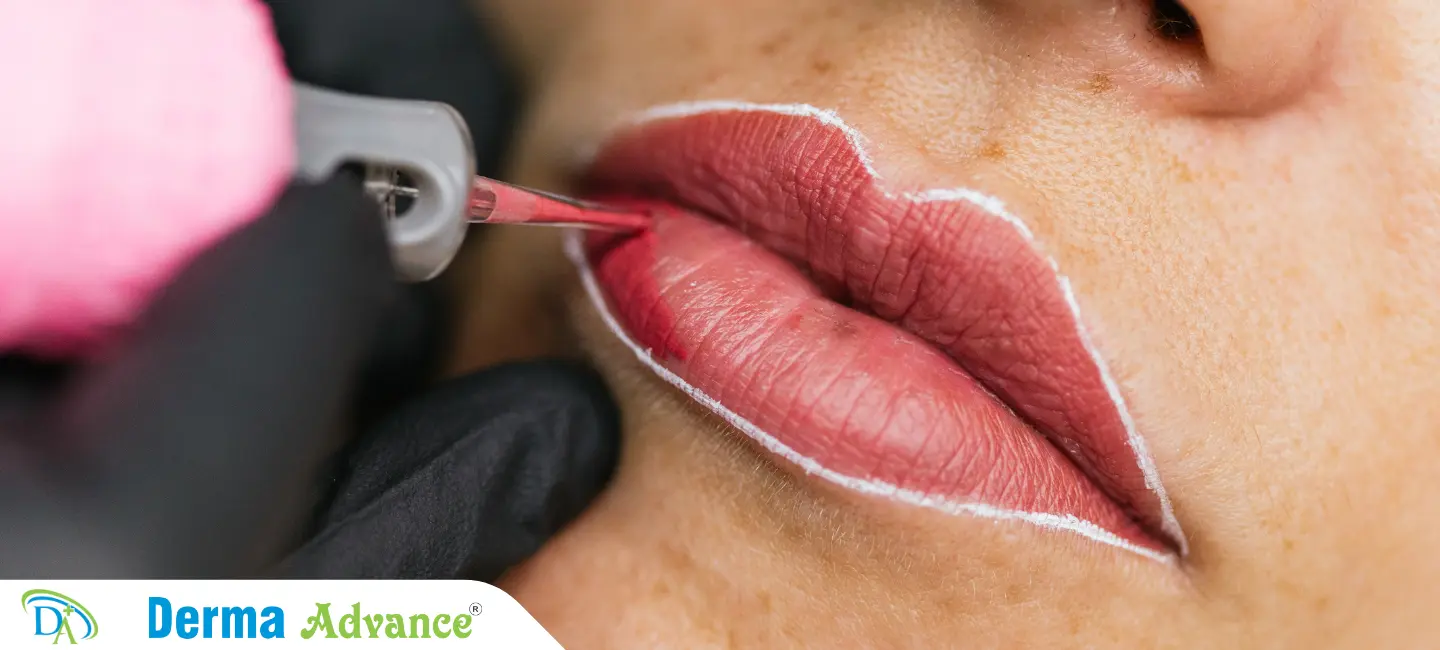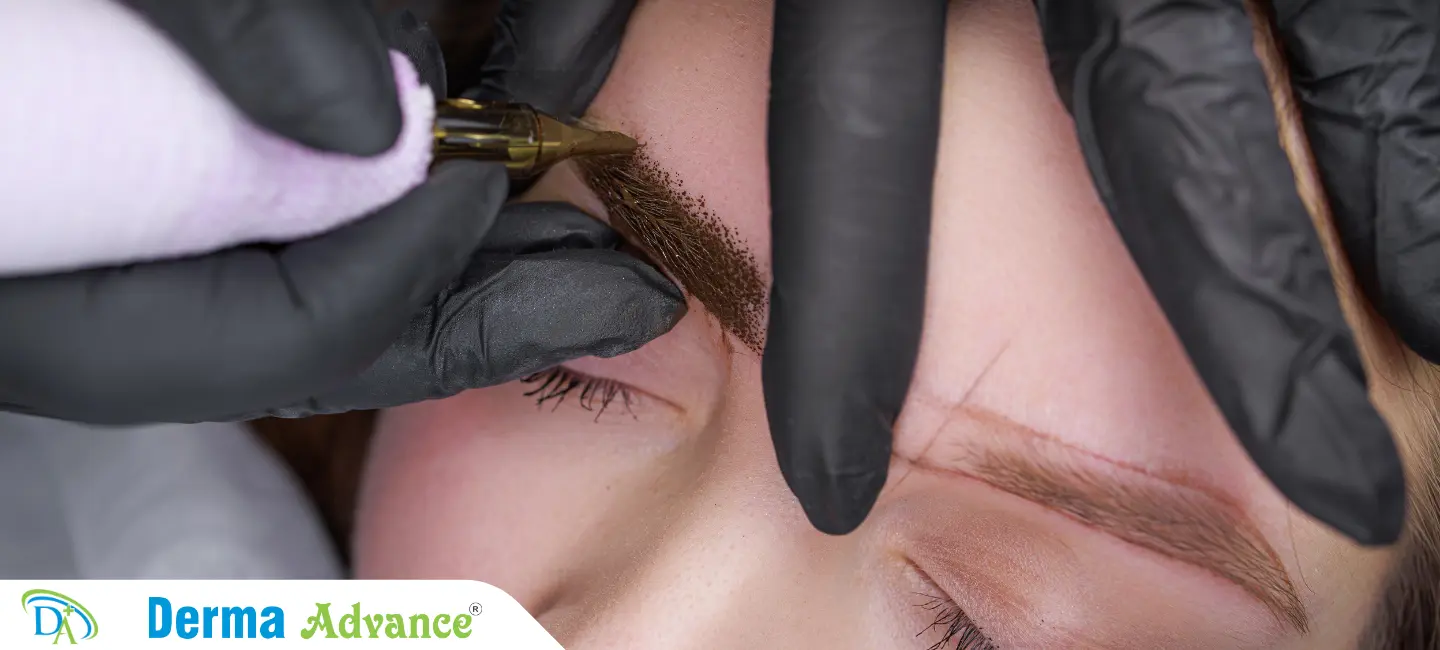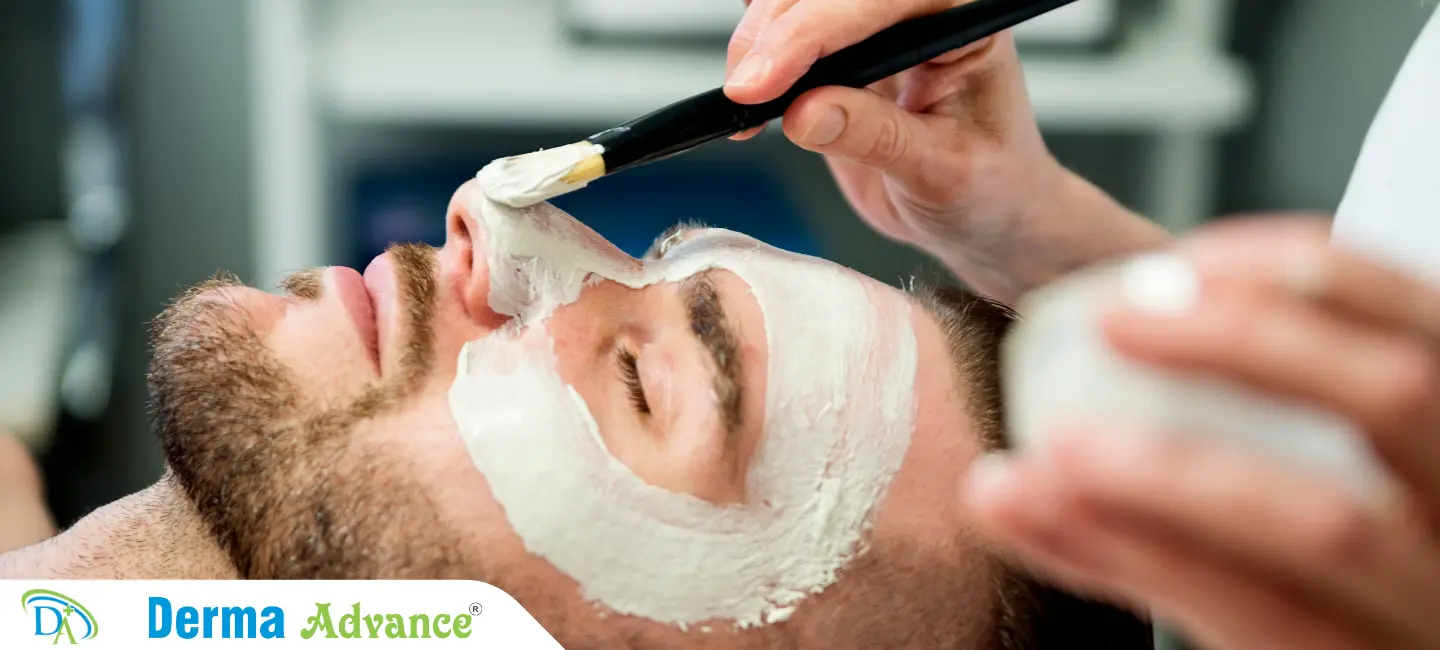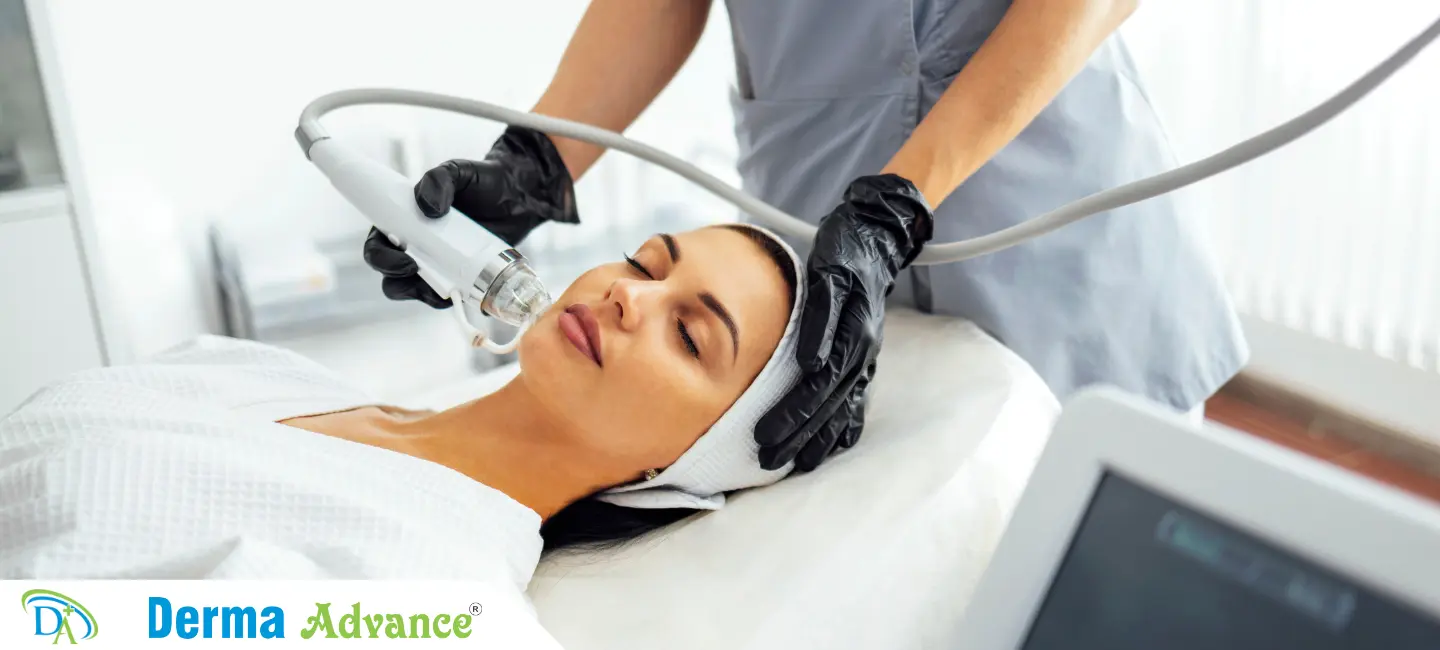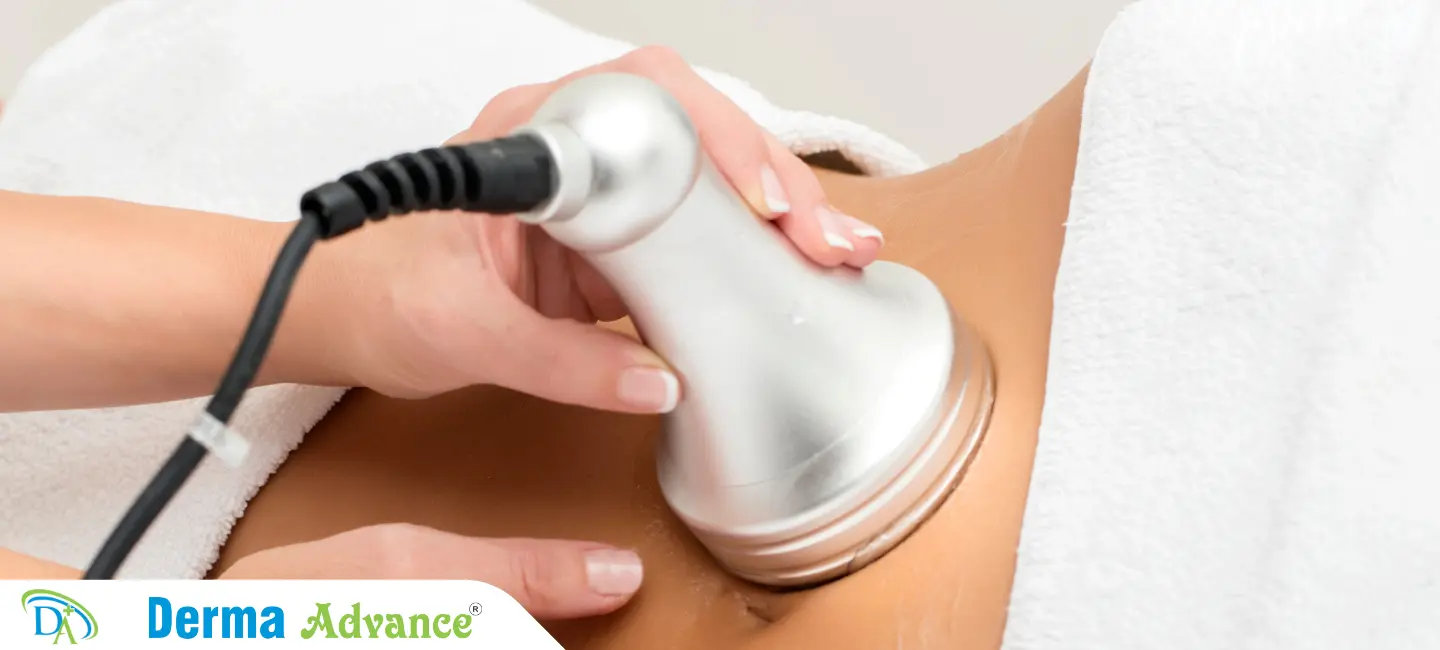What is Rosacea?
Rosacea is a chronic skin condition characterized by facial redness, visible blood vessels, and pimple-like bumps. It often affects the cheeks, nose, chin, and forehead.
Rosacea is a chronic inflammatory skin condition that primarily affects the face, causing persistent redness, visible blood vessels (telangiectasia), and sometimes, acne-like bumps (papules) and swelling. It typically begins with a tendency to flush or blush easily. Over time, untreated rosacea can worsen, leading to more prominent symptoms and potential complications, such as eye irritation (ocular rosacea). This condition can vary widely in severity and may affect different areas of the face, including the cheeks, nose, chin, and forehead. Identifying and managing triggers, such as sun exposure, stress, certain foods, and alcohol, is crucial in controlling symptoms and improving quality of life for individuals with rosacea.
Derma Advance specializes in diagnosing and treating rosacea, offering personalized care to manage symptoms and enhance skin health.
Immense Care
We aim to provide immense care tailored to manage and treat your health condition. Be assured, you are in safe hands!
Modern Techniques
We provide modern treatments to ensure you get the quickest and most effective solution to your health conditions!
Symptoms of Rosacea
What are the Symptoms of Rosacea?
Rosacea manifests primarily on the face and can vary widely in severity and presentation. The symptoms often include persistent facial redness, visible blood vessels (telangiectasia), and a tendency to flush or blush easily. This chronic inflammatory skin condition may also lead to acne-like bumps (papules) and pus-filled pimples (pustules), which resemble acne but are unrelated to bacterial infection. In more severe cases, the skin may thicken and develop a bumpy texture, especially around the nose (rhinophyma).
Beyond the skin, rosacea can affect the eyes, causing dryness, irritation, and redness—known as ocular rosacea. Other common symptoms include a burning or stinging sensation on the face, sensitivity to skincare products, and swelling or edema of the face. The symptoms of rosacea often come and go, flaring up periodically and then subsiding. Identifying triggers such as sun exposure, stress, spicy foods, alcohol, and certain skincare products is essential in managing and minimizing symptom flare-ups.
Derma Advance specializes in diagnosing and treating rosacea, offering comprehensive care to alleviate symptoms and improve skin health.
Persistent Facial Redness:
Characterized by persistent redness affecting the central face, including cheeks, nose, forehead, and chin. Redness worsens over time and is triggered by sunlight, heat, wind, exercise, alcohol, and spicy foods.
Visible Blood Vessels (Telangiectasia):
Small, visible blood vessels on the skin’s surface, especially on cheeks, nose, and chin. These appear as fine red lines or web-like patterns, contributing to skin redness and sensitivity.
Flushing Easily:
Sudden, intense redness or flushing of the face triggered by heat, sunlight, spicy foods, alcohol, stress, or emotions. May include warmth or burning sensation in the skin.
Acne-like Bumps (Papules):
Small, solid, red raised bumps on rosacea-affected skin. Tender to touch and distinct from acne due to absence of pus, blackheads, or whiteheads.
Pus-filled Pimples (Pustules):
Inflamed lesions filled with pus on rosacea-affected skin. Red and tender, often appearing in clusters without blackheads or whiteheads.
Dry, Irritated Eyes (Ocular Rosacea):
Affects eyes with symptoms like dryness, burning, itching, sensitivity to light (photophobia), and feeling of a foreign object. Can occur alongside facial rosacea symptoms, impacting eye comfort and vision.
Diagnosis of Rosacea
1
Visual Examination:
Dermatologists at Derma Advance perform a visual inspection to identify typical signs of rosacea, such as facial redness, visible blood vessels (telangiectasia), and acne-like bumps (papules and pustules). This initial assessment helps in distinguishing rosacea from other skin conditions.
2
Patient History Assessment:
Gathering a comprehensive medical history is crucial. Our dermatologists inquire about symptoms, triggers that worsen or alleviate the condition (such as stress or certain foods), previous treatments, and family history of rosacea. This information aids in forming an accurate diagnosis and personalized treatment plan.
3
Skin Biopsy (if needed):
In some cases, a skin biopsy may be recommended to confirm the diagnosis, especially if the symptoms are atypical or other conditions need to be ruled out. A small sample of skin is examined under a microscope to detect any abnormalities characteristic of rosacea.
4
Digital Imaging Analysis:
Advanced imaging technologies may be used to analyze the skin's condition digitally. This method helps quantify the severity of redness and monitor changes over time. Digital imaging provides valuable insights for treatment planning and assessing treatment effectiveness.
5
Blood Tests (if indicated):
Occasionally, blood tests are conducted to rule out systemic conditions that may mimic rosacea or exacerbate symptoms. These tests help ensure a comprehensive evaluation and assist in managing any underlying health factors.
5
Consultation and Collaboration:
At Derma Advance, collaboration between dermatologists and other specialists may be recommended for complex cases. Consulting with ophthalmologists for ocular rosacea or other healthcare providers ensures holistic care and addresses all aspects of the condition.
Book Your Appointment
Find Solution to Rosacea Now!
Meet Our Expert Rosacea Specialists


Treatment of Rosacea
How is Rosacea treated?
At Derma Advance, we tailor treatments for rosacea to suit each patient's symptoms and skin type. We use topical treatments like antibiotics or azelaic acid to reduce redness and inflammation. For more severe cases, oral medications such as antibiotics or isotretinoin may be prescribed to target underlying inflammation.
In addition to medications, we offer laser therapy and intense pulsed light (IPL) treatments to address visible blood vessels and persistent redness associated with rosacea. These advanced treatments help achieve clearer and more even-toned skin.
Alongside medical interventions, lifestyle modifications play a crucial role. Identifying and avoiding triggers such as spicy foods and alcohol can significantly reduce flare-ups and improve treatment outcomes. Our approach at Derma Advance aims to provide comprehensive care, managing rosacea effectively while enhancing overall skin health and well-being.
Topical Treatments
Utilizing specialized creams and gels containing antibiotics or azelaic acid to alleviate redness and inflammation in rosacea-prone skin. At Derma Advance, these treatments are customized to match individual skin types and conditions.
Oral Medications
Prescribing oral antibiotics or isotretinoin for more severe cases of rosacea, targeting underlying inflammation and reducing symptoms effectively. Our dermatologists at Derma Advance ensure personalized treatment plans for optimal results.
Laser and IPL Therapy
Employing advanced laser therapy and intense pulsed light (IPL) treatments to diminish visible blood vessels and persistent redness associated with rosacea. These non-invasive procedures at Derma Advance promote clearer, more even-toned skin over multiple sessions.
Comprehensive Skin Care Plans
Creating tailored skin care regimens that integrate medical treatments with gentle cleansers, moisturizers, and sunscreens. Derma Advance emphasizes holistic care to manage rosacea symptoms and maintain skin health.
Trigger Identification and Avoidance
Educating patients on identifying and avoiding triggers such as spicy foods, alcohol, and extreme temperatures that exacerbate rosacea symptoms. This proactive approach from Derma Advance helps minimize flare-ups and support long-term treatment success.
Ongoing Monitoring and Support
Providing regular follow-ups and adjustments to treatment plans at Derma Advance to ensure optimal symptom management and patient satisfaction. Our commitment is to deliver comprehensive care, empowering patients to effectively manage rosacea and achieve healthier skin.
Causes of Rosacea
1
Genetic Predisposition:
Genetic factors play a significant role in rosacea, with a family history often increasing the likelihood of developing the condition. At Derma Advance, we consider genetic predispositions in our personalized treatment plans.
2
Environmental Triggers:
Environmental factors such as sun exposure, extreme temperatures, humidity, and wind can exacerbate rosacea symptoms. Our dermatologists at Derma Advance provide guidance on managing environmental triggers to minimize flare-ups.
3
Vascular Abnormalities:
Rosacea is associated with vascular abnormalities that cause flushing and persistent redness. At Derma Advance, we utilize advanced diagnostic techniques to assess vascular health and customize treatments targeting these abnormalities.
4
Demodex Mites:
Overgrowth of Demodex mites on the skin is linked to rosacea symptoms, including inflammation and irritation. Our comprehensive evaluations at Derma Advance include assessing Demodex levels to inform targeted treatment approaches.
5
Immune System Responses:
Abnormal immune responses contribute to inflammation and skin sensitivity in rosacea patients. Derma Advance offers treatments that aim to modulate immune reactions, promoting skin health and reducing symptoms.
6
Lifestyle Factors:
Lifestyle choices such as diet, stress, and alcohol consumption can impact rosacea severity. Our holistic approach at Derma Advance includes lifestyle modifications to complement medical treatments and improve overall skin condition.
How to Prevent Rosacea?
Rosacea is a chronic skin condition characterized by facial redness, visible blood vessels, and pimple-like bumps. It often affects the cheeks, nose, chin, and forehead.
To prevent Rosacea, maintain a skincare routine with gentle products suitable for sensitive skin. Use mild cleansers and moisturizers to protect your skin barrier and reduce irritation. Daily application of sunscreen (SPF 30+) is essential to shield your face from UV rays that can worsen symptoms.
Identify and avoid triggers like spicy foods, alcohol, and extreme temperatures, as they can provoke Rosacea flare-ups. Keeping a trigger diary can help you manage these factors better. Manage stress through techniques like meditation or yoga, as stress can exacerbate symptoms. For personalized advice and treatment plans, consult Derma Advance for expert guidance in managing Rosacea effectively.

